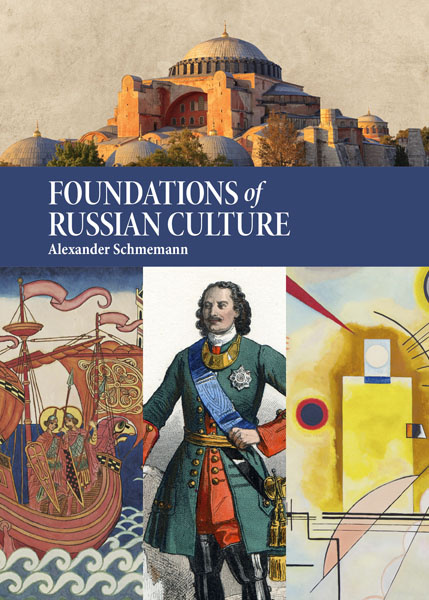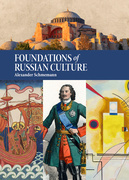Foundations of Russian Culture
- AvailablePaperback9781942699507312 pages: USD 24.95 / GBP 22.95 Add to basket
- AvailableDigital9781942699545: USD 9.99
— About the Book —
A culture that demands only freedom from politics, while rejecting and shunning politics itself, remains inadequate, lifeless, and is ultimately doomed. In its turn, politics that rejects the spiritual oversight of culture inevitably degenerates into tyranny or anarchy, into corruption and mediocrity.
Inside this deceptively modest volume will be found a remarkably prescient collection of broadcasts, that are perhaps even more pertinent to the contemporary culture and politics of Russia than they were to the audience within the Soviet Union to whom they were originally addressed. Schmemann presents the complex history of Russia and analyzes trends and tendencies within its culture concisely and simply: showing them to be frequently contradictory and even mutually exclusive. He clarifies the multilayered meaning of “foundations”—its underlying building blocks, the spiritual, the political, the historical, as well as the cultural assets in literature, art, science, and philosophy. In these elements he shows what Russia is grappling with in its struggle to find a synthesis that draws both from its own unique elements and its historical and ongoing interconnectedness with the “West” and the “East.”
— Author Biography —
Protopresbyter Alexander Schmemann (1921-1983) was born in Estonia, raised and educated in France. He spent most of his working life in the United States as an Orthodox priest, educator, author and radio broadcaster, serving as Dean of St Vladimir's Seminary in Yonkers, New York from 1962 until his death in 1983. Many of his books remain in print both in English, Russian and other languages.
— Contents —
Foreword
Introduction
Note to the Reader
- The Cultural Debate in the USSR: A Protest
- The Dispute Over Culture in the Soviet Union
- “Culture” in Russian Self-Identity
- Paradoxes of Russian Cultural Development: Maximalism
- Paradoxes of Russian Cultural Development: Minimalism
- Paradoxes of Russian Cultural Development: Utopianism
- The “Explosion” of Russian Cultural Identity in the Nineteenth Century (1)
- The “Explosion” of Russian Cultural Identity in the Nineteenth Century (2)
- The “Explosion” of Russian Cultural Identity in the Nineteenth Century (3)
- Renunciation of Culture in the Name of Pragmatism
- Renunciation of Culture in the Name of Religion
- Renunciation of Culture in the Name of Social Utopia
- Tolstoy and Culture
- Dostoevsky and Russian Culture
- Cultural Identity at “the Beginning of the Century” (1)
- Cultural Identity at “the Beginning of the Century” (2)
- Abandonment of the Moral Foundations of Culture
- The Initial Reaction to the Revolution
- The Enslavement of Culture
- Creative Resistance (1)
- Creative Resistance (2)
- Creative Resistance (3)
- The Past and Tradition
- The West
- Technology and Science
- Social Topics
- Religious Themes
- At A Crossroads
- On the Path to Synthesis (1)
- On the Path to Synthesis (2)
- Conclusion
Acknowledgments
Notes
Index of Names






